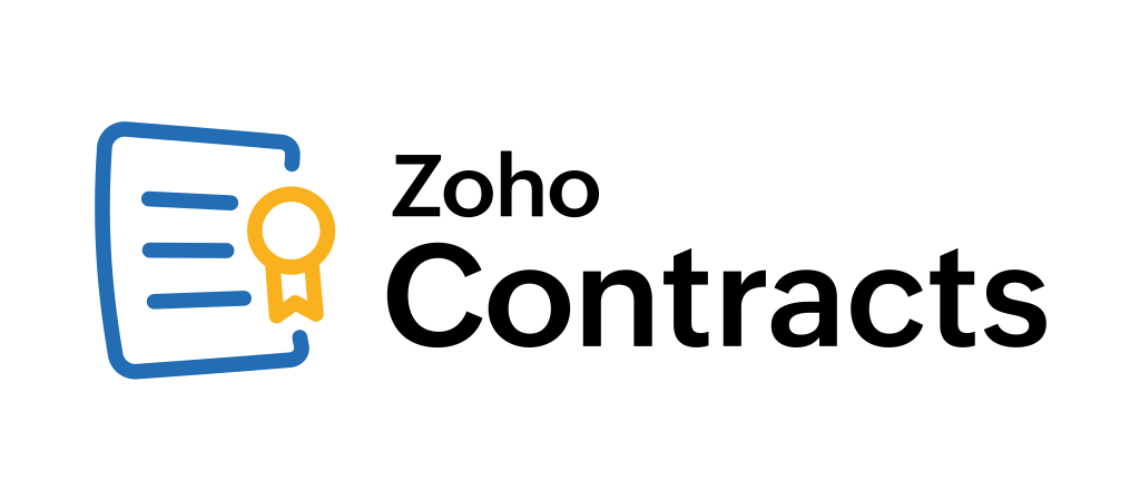Introduction
The development of contract management software by Zoho Contracts. Contracts are at the core of commercial relationships and govern every dollar entering or leaving a business. However, there are several challenges involved in contract management, which have been evident for years. The adoption of contract management has increased due to increasing complexities in global supply chains, geopolitical tensions, uncertainties, and regulatory updates. Businesses are forced to change policies and clause languages in their contracts due to these changes.
Zoho Contracts aims to provide flexible pricing models and risk mitigation, as well as address consolidation trends. They believe that contracts are dynamic documents that can evolve into growth engines. Their mission is to build contract management software that holistically addresses these problems to facilitate better business outcomes.
The software addresses four aspects:
- functionally streamlining an individual contract lifecycle from authoring to termination
- risk mitigation
- improving governance
- making audit-ability easy
- making users accountable
- making the system transparent and enabling admins with better control.
Cross-functional integration is also crucial, as every function involved in contracts must track and manage obligations when handed over to the implementation team.
How Zoho Contracts and Zoho CRM integration works and how users can derive maximum value from it. It will also touch upon other aspects such as streamlining an individual contract lifecycle, mitigating risk, and improving governance.
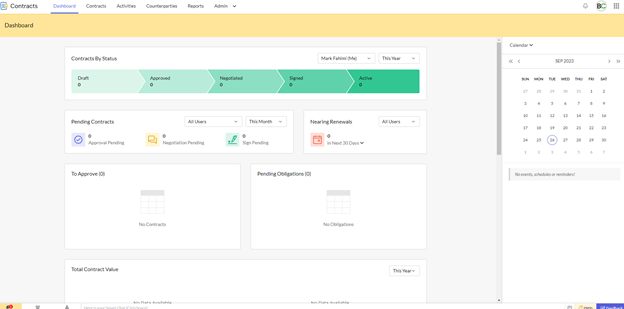
Zoho Contracts Integration
The Zoho Contracts home screen provides a personalized dashboard for users to understand their contracts’ performance. To integrate Zoho Contracts, users need to install the Zoho CRM UI plugin or third-party integration into Zoho CRM. This allows users to map account fields to counterparty fields in Zoho Contracts, reducing the need to enter account information in Zoho CRM. Additionally, legal teams can set assignment rules for contract types and assign fields for individual contract types.
When creating a contract in Zoho Contracts, users can choose the contract type, such as a product sales agreement, and view associated fields. The request contract button in Zoho CRM allows users to create a new contract document, assigned to the legal associate. The contract document can be viewed in the attachment section of the deal record, allowing salespeople to download, send, or view the language used in the contract.
A related list called Zoho Contracts displays all initiated contracts from a deal record, allowing salespeople to track their status and initiate requests based on the contractor’s stage. This improves transparency between Zoho CRM users and legal functions, allowing salespeople to initiate renewal requests when contracts approach expiry.
Overall, the Zoho Contracts and Source CRM integration offers numerous value add-ons for users, improving sales contract management efficiency and transparency.
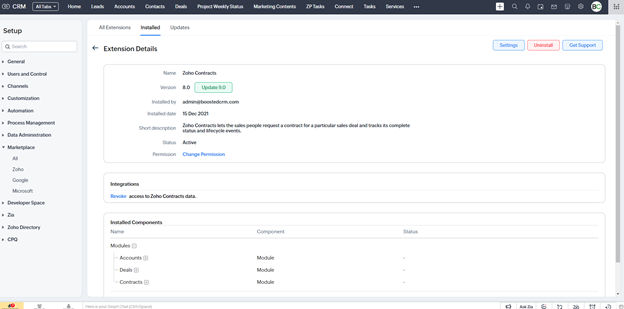
Zoho Contracts Module
Zoho Contracts streamlines the contract lifecycle, starting with authoring and storing all contracts in the contracts module. It improves visibility, allows access to critical information, and features filter and search options.
Create a New Contract
Zoho Contracts allows users to create new contracts by importing existing or expired contracts, or creating a contract from scratch. The import contract option allows users to view the status of the contracts and fill in necessary details. The contract type is a fundamental configuration that defines the primary attributes of a contract, such as approval workflow and intent.
Zoho Contracts offers 13 predefined contract templates, some of the most commonly used business contract templates, and allows users to create as many custom templates as they want. The contract creation wizard allows users to specify details like contract term, termination notice period, manual or auto renewal.
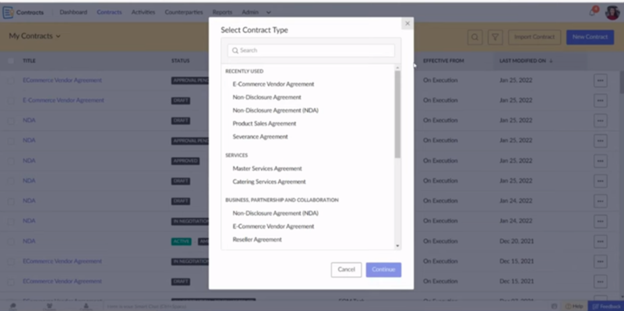
Contract Authoring
The contract authoring section automatically generates a new document with default classes, allowing users or contract owners to edit the template. The clauses tab in the document editor panel allows users to remove or add clauses, making contract authoring more efficient. Additionally, multiple languages can be added to the same clause, eliminating the need for multiple templates. The advanced document assembly, powered by Zoho Writer, offers formatting options similar to full-blown Word processors. This allows real-time collaboration, commenting, and setting visibility for comments. Collaborators can be added and permissions set, such as fill feeds, to enable the authoring process. Once the contract authoring is complete, collaborators and the contract owner can finalize the draft. This advanced document assembly simplifies contract authoring and streamlines the process.
Contract Approval Workflow
Configuring an approval workflow for contracts increases compliance and reduces risk by ensuring all stakeholders are aware of potential risks and opportunities at an individual contract level. Zoho contracts allow for sequential or parallel workflows, allowing for better visibility and submission of contracts.
Contract Details Panel
The contract details panel automatically switches to the approval tab to display only relevant information for approval. The activity section provides the current status of the contract within a specific stage, avoiding email back and forth. The personalized dashboard displays all pending approvals, allowing users to view the document or contract pending approval.
Approvers can add contextual comments, set visibility, and add a message for the contract owner at the time of approval. Once approved, the document can be sent for negotiation.
Negotiation Panel
Traditionally, negotiations involve sending contracts via email, but this method can be difficult to track and compare due to multiple rounds. Zoho Contracts addresses this issue by providing controlled access for counterparties. When a contract is sent for negotiation, you can add negotiators, set permissions, and send unique passwords. These contacts do not need a Zoho account or Zoho Contracts account to participate. They can suggest changes to the contract document in real-time, add comments, and set visibility for comments.
At the time of review completion, the primary contact can complete the review, specify a message to the contract owner, and show readiness for signature. This allows them to collaborate and suggest changes without requiring a Zoho account.
Review Summary
After completing the review, the contract owner receives a summary detailing the negotiation process, changes made, commands added, and signature readiness. They can accept or reject suggested changes, reply to comments, or resend the contract for negotiation. This process continues until both parties agree on all terms.
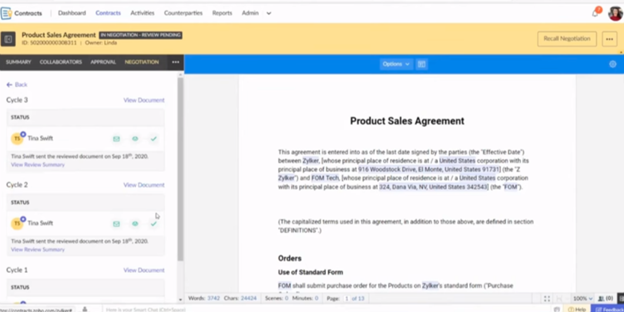
Negotiation Stage
The negotiation tab in Zoho contracts allows contract owners to view previous cycles of a contract, view documents sent for a particular negotiation cycle, and compare changes between versions. This feature is also available for counterparty contacts, who can compare the latest version with previous versions and view the document sent for a particular cycle. Once the contract is negotiated, it can be sent for signature. Zoho contracts is tightly integrated with Zero Sign, allowing signers from both parties to be added at the time of signature or execution. Signers can also set an execution workflow, allowing them to sign the document in minutes. This eliminates the need for print, email, or fax cycles, and the contract becomes active based on the set effective date.
Active Contract
Zoho Contracts offers a unique feature called smart letter templates, which allow users to configure a contract letter at the time of amendment. This feature allows contract owners to edit the contract document like any other document, capturing any changes made to the contract. The amendment letter captures the entire history of the contract, past amendments, extensions, or renewals, and all current changes made in the amendment. This eliminates human intervention during the post-execution management phase, avoiding errors.
Zoho Contracts also addresses risk mitigation by addressing contract obligations. Contract owners can track and manage contractual obligations within the context of the contract, either at the time of authoring or at the time of execution. Obligations can be either recurring tasks or non-tasks, such as in non-disclosure agreements. This helps to ensure compliance with legal requirements and prevents financial and reputational damage. The contextual obligation module allows contract owners to track and manage obligations within the contract context, ensuring compliance with legal requirements.
Activities
In Zoho contracts, approvals and obligations are referred to as activities. Users can view pending approvals and obligations, access their context, and update contract statuses. The obligations module allows users to track changes within the contract. Zoho contracts’ advanced analytics help improve governance by providing a high-level overview of all obligations in the business. By utilizing advanced analytics, Zoho contracts can provide valuable business and strategic insights from contract data.
Reports
The reports module offers over 35 reports covering various aspects of contract management. General reports group contracts based on statuses or contract types, while activity and milestone reports help identify stagnating contracts. Performance reports assess the contract lifecycle process, with cycle time being a key metric for understanding the health of the contract life cycle. By analyzing average cycle time by contract type, users can identify contracts taking longer for execution.
Top Contracts
Identify clauses defined during negotiation and adjust your negotiation strategies accordingly. This refines your contract management process and aids in making organizational policy changes, such as regulations that translate into policy changes.
Impact Studies
To effectively implement policy changes, an admin needs to know the number of contracts with specific clauses. Zoho contracts provide this information in a table format, making change management simple and impacting decisions. Similar insights are available across obligations, counterparties, and users. Analytics also play a crucial role in this process.
Analytics
The Zoho Contracts dashboard provides a personalized view of contracts, their status, approved contacts, and pending activities. It also displays financial information, allowing for forecasting business performance and tracking performance across different time filters. The dashboard also features a monthly calendar, contract milestones, overview applications, expiry notifications, and upcoming renewals, ensuring you never miss a renewable opportunity. Contract renewals are crucial for revenue expansion, but many miss them due to inefficient contract management. Zoho Contracts offers in-app and email alerts for contract milestones, ensuring you never miss any important milestones. This analytical aspect of the dashboard is crucial for broader governance, as contracts contain critical information.
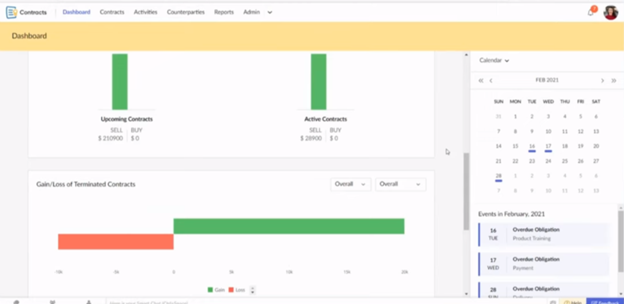
Activity Tracking
Activity tracking in Zoho contracts simplifies auditability by displaying activities performed by users in chronological order and highlighting changes made in specific contracts. Activity logs, available for export or download, provide detailed information on user access, changes made to the admin console, and the current users logged in. This feature is particularly useful for contracts dealing with critical information.
Data Protection
In Zoho contracts, a data protection feature is provided to enable businesses and counterparties to protect their data. This feature allows users to choose fields containing personal information of counterparties and restrict non-admins from downloading their data. This feature is crucial for accepting demands from counterparties during termination.
Stop Processing Data
The counterparty module displays all counterparty contacts and their contracts, allowing users to stop processing their data on demand. This feature is crucial for compliance with data protection regulations. Users can choose a contact, click on the “more” option, and click “stop processing data.” The tool will stop processing the data and anonymize it, even if the contract is deleted.
The tool tracks all activities performed by the counterparty contact, replacing personally identifiable information with numbers. This data protection regulation is a key strength of the CRM system.



